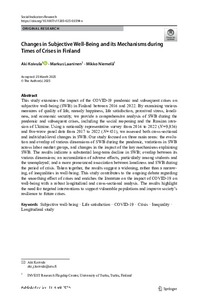Changes in Subjective Well-Being and its Mechanisms during Times of Crises in Finland
Koivula, Aki; Laaninen, Markus; Niemelä, Mikko
https://urn.fi/URN:NBN:fi-fe2025082791438
Tiivistelmä
This study examines the impact of the COVID-19 pandemic and subsequent crises on subjective well-being (SWB) in Finland between 2016 and 2022. By examining various measures of quality of life, namely happiness, life satisfaction, perceived stress, loneliness, and economic security, we provide a comprehensive analysis of SWB during the pandemic and subsequent crises, including the social reopening and the Russian invasion of Ukraine. Using a nationally representative survey from 2016 to 2022 (N = 9,936) and five-wave panel data from 2017 to 2022 (N = 431), we assessed both cross-sectional and individual-level changes in SWB. Our study focused on three main areas: the evolution and overlap of various dimensions of SWB during the pandemic, variations in SWB across labor market groups, and changes in the impact of the key mechanisms explaining SWB. The results indicate a substantial long-term decline in SWB; overlap between its various dimensions; an accumulation of adverse effects, particularly among students and the unemployed; and a more pronounced association between loneliness and SWB during the period of crisis. Taken together, the results suggest a widening, rather than a narrowing, of inequalities in well-being. This study contributes to the ongoing debate regarding the smoothing effect of crises and enriches the literature on the impact of COVID-19 on well-being with a robust longitudinal and cross-sectional analysis. The results highlight the need for targeted interventions to support vulnerable populations and improve society’s resilience to future crises.
Kokoelmat
- Rinnakkaistallenteet [29335]
